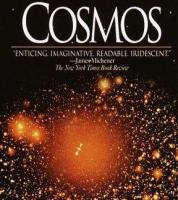Eudaimonist
In Galt We Trust
- Messages
- 297
- Reaction score
- 0
- Points
- 0
The Cosmos Is Not Enough
(Written by myself, and originally published in the August 2005 issue of The Eudaimonist, the official newsletter of the Fellowship of Reason, Inc. All rights reserved.)
When I was little, I would stare up at the stars with profound wonder for the vastness and timelessness of the universe. At five, my mother let me have her old college astronomy textbook, and it became my first Bible. At thirteen, when I faithfully tuned in to public television for every segment of Carl Sagan’s Cosmos, it was like I was attending church, not a science classroom. I felt that Sagan’s naturalistic spirituality was my own.

However, when I reached my twenties, my spirituality changed. I did not discover religion – quite the contrary, I became a confirmed atheist. However, I felt that I had graduated from my kindergarten of spiritual development and entered into a more complete form of non-theistic spirituality. I was surprised that most naturalists did not even seem to be aware that there were other spiritual options for them besides Carl Sagan’s.

Spirituality Without Faith is a good example of what I mean. The article starts off well enough. It states, “Just as we can be good without God, we can have spirituality without spirits.” Why is this? Because spirituality “involves an emotional response…which can include feelings of significance, unity, awe, joy, acceptance, and consolation,” and which can “help us in dealing with difficult situations involving death, loss, and disappointment.” This emotional response is evoked through a cognitive context, i.e. our ideas of our place in the universe, and through spiritual practice, such as “meditation and participation in various rituals and ceremonies.” The article goes on to criticize dualistic spiritualities for denigrating the physical, thus leading to “alienation from our physical selves and indeed from the material world as a whole”, and for creating an epistemological conflict between reason and alleged personal revelations from spiritual experience.
I agree so far. So, what is the proposed alternative? The article argues that a naturalistic spirituality can provide a feeling of connection with the world, and since we are fully natural beings connected through causality to a natural universe, it happens to be true. Naturalism also provides mystery by denying the possibility of answers to any questions of ultimate meaning or purpose. And, finally, it leads to wonder at the workings of the universe, and its vastness.

There is nothing wrong with having these experiences. My objection to this spiritual package is in what it lacks – the personal. Focusing on the universe without places too little emphasis on the universe within – our experience as self-determining beings with purposes and stories of our own that go far beyond a contemplation of our quantum makeup. An important aspect of traditional religious spirituality to which the article gives no alternative is “the entire emotional realm of man’s dedication to a moral ideal,” which Ayn Rand discusses in her introduction to The Fountainhead. Of course, she didn’t advocate traditional religious spirituality, but rather a eudaimonistic actualization of one’s highest potentialities, and in so doing one may experience “the exaltation of man’s self-esteem and the sacredness of his happiness on earth.”

I could say that I had found a sense of connection with my daimon – meaning: with my highest potentialities, which are my personal moral ideal – and about this I feel both mystery and wonder, as one might feel while reading a good epic novel. And, in my pursuit of this moral ideal, I have gained a measure of the spiritual fruits of self-esteem and happiness. If we are to avoid alienation from the complete richness of human life, the Cosmos is not enough.

eudaimonia,
M.
(Written by myself, and originally published in the August 2005 issue of The Eudaimonist, the official newsletter of the Fellowship of Reason, Inc. All rights reserved.)
When I was little, I would stare up at the stars with profound wonder for the vastness and timelessness of the universe. At five, my mother let me have her old college astronomy textbook, and it became my first Bible. At thirteen, when I faithfully tuned in to public television for every segment of Carl Sagan’s Cosmos, it was like I was attending church, not a science classroom. I felt that Sagan’s naturalistic spirituality was my own.

However, when I reached my twenties, my spirituality changed. I did not discover religion – quite the contrary, I became a confirmed atheist. However, I felt that I had graduated from my kindergarten of spiritual development and entered into a more complete form of non-theistic spirituality. I was surprised that most naturalists did not even seem to be aware that there were other spiritual options for them besides Carl Sagan’s.

Spirituality Without Faith is a good example of what I mean. The article starts off well enough. It states, “Just as we can be good without God, we can have spirituality without spirits.” Why is this? Because spirituality “involves an emotional response…which can include feelings of significance, unity, awe, joy, acceptance, and consolation,” and which can “help us in dealing with difficult situations involving death, loss, and disappointment.” This emotional response is evoked through a cognitive context, i.e. our ideas of our place in the universe, and through spiritual practice, such as “meditation and participation in various rituals and ceremonies.” The article goes on to criticize dualistic spiritualities for denigrating the physical, thus leading to “alienation from our physical selves and indeed from the material world as a whole”, and for creating an epistemological conflict between reason and alleged personal revelations from spiritual experience.
I agree so far. So, what is the proposed alternative? The article argues that a naturalistic spirituality can provide a feeling of connection with the world, and since we are fully natural beings connected through causality to a natural universe, it happens to be true. Naturalism also provides mystery by denying the possibility of answers to any questions of ultimate meaning or purpose. And, finally, it leads to wonder at the workings of the universe, and its vastness.

There is nothing wrong with having these experiences. My objection to this spiritual package is in what it lacks – the personal. Focusing on the universe without places too little emphasis on the universe within – our experience as self-determining beings with purposes and stories of our own that go far beyond a contemplation of our quantum makeup. An important aspect of traditional religious spirituality to which the article gives no alternative is “the entire emotional realm of man’s dedication to a moral ideal,” which Ayn Rand discusses in her introduction to The Fountainhead. Of course, she didn’t advocate traditional religious spirituality, but rather a eudaimonistic actualization of one’s highest potentialities, and in so doing one may experience “the exaltation of man’s self-esteem and the sacredness of his happiness on earth.”

I could say that I had found a sense of connection with my daimon – meaning: with my highest potentialities, which are my personal moral ideal – and about this I feel both mystery and wonder, as one might feel while reading a good epic novel. And, in my pursuit of this moral ideal, I have gained a measure of the spiritual fruits of self-esteem and happiness. If we are to avoid alienation from the complete richness of human life, the Cosmos is not enough.

eudaimonia,
M.
